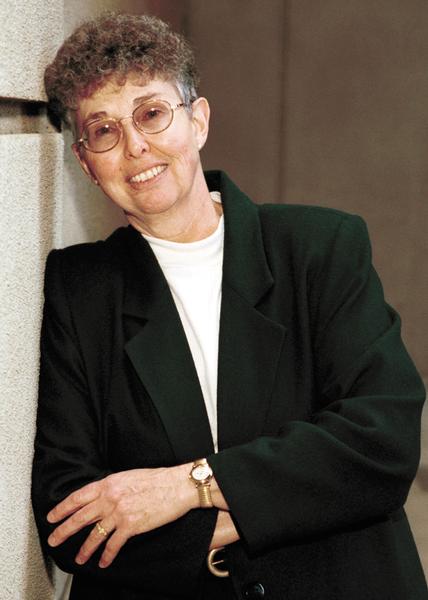Lesbian activist shares her story

Image: Lesbian activist shares her story::
February 12, 2001
“Imagine arriving at a hospital and trying to find out for two hours if your loved one is alive or dead ? but you could not find out anything because you were not “family”, said Karen Thompson, human rights speaker.
In front of a small, but attentive audience in Hinde Auditorium Thursday, Thompson described what it was like for her and her lesbian partner, Sharon Kowalski as she painfully recounted the story of her battle to get Kowalski back home after a disabling accident caused by a drunk driver.
Thompson, who speaks not only on gay, lesbian and disabled rights but human rights in general said that because her and her partner were lesbian, she had lost all legal rights to having any say about the care for her partner who had brain trauma and was in a coma from the accident.
Even though they had been living together for three years and her partner, Kowalski was 28, Thompson said that Kowalski?s parents were given the right to act as guardians after the accident.
Thompson was forced to enter into a guardianship struggle after being told that she could no longer see Kowalski.
“We suffered more from society?s “isms” than we did from the accident itself,” said Thompson.
Although Kowalski was severely disabled and suffered short-term memory loss, Thompson said she showed signs of progress in her recovery until she was placed in a nursing care home, where she was eventually fed through a tube and not encouraged to do physical tasks or exercise.
Thompson, who has educational background in physical and occupational therapy, said that she knew she could give Kowalski better care but was denied the right, repeatedly by the judges.
Kowalski was not able to verbalize and was determined incompetent as far as her own decisions.
“Sharon was given less input in her own case than a child in a custody case,” said Thompson.
Thompson?s voice still carried tones of sadness and anger as she went on describing the countless court hearings, the many denials, and the inevitable damage that continued to take its toll on her and Kowalski?s lives, all because they were not entitled to the same rights as everyone else because they were lesbians.
“After eight and a-half years and $300,000 in legal fees,” said Thompson, “Sharon was finally granted the right to be heard.” Thompson said that after nine and a-half years she was finally able to take Kowalski home.
“Sharon returned home incapacitated,” said Thompson. “Her teeth had rotted from lack of having proper oral care. Her arm was attached to her body from lack of exercise. She had to have surgeries to cut tendons to detach her arm, her feet had curled up, she could not walk.”
Thompson said that Kowalski?s condition would not have deteriorated had she been able to come home and receive the care that she should have been entitled to.
“Should I not have access to human rights because of who I am?” said Thompson. “Shouldn?t everyone have the right to feel safe? Shouldn?t everyone have the right to fair treatment?”
Thompson said she would like to see the tossed salad approach in our system, a society that is a little bit of everything mixed in, all different but each adding something unique to our culture.
She encouraged her audience to use the word disability instead of handicapped.
At the close of her very compassionate delivery, Thompson listed a number of things that people could do to increase awareness in the matter of human rights for all.
Her list included these simple steps:
1. Educate yourself and others.
2. Go to programs.
3. Write letters.
4. Speak up.
5. Counter negative messages.
6. Participate in marches.
7. Avoid making assumptions.
8. Act consistently.
9. Ensure diversity.




























































































































